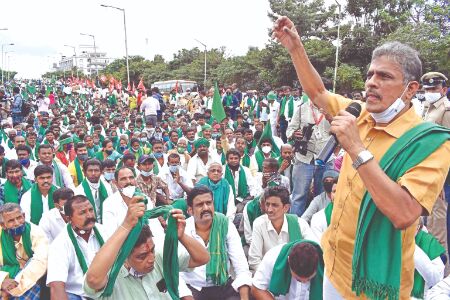Communicating farm reforms
While the new farm bills will bring much-needed reforms, continuing miscommunication with the farmers has seen the Government’s intentions being lost in translation

Almost for the last twenty days, the agitation of the farmers has been catching the national headlines and a situation of stalemate has been created. It is hoped that very soon a solution which is acceptable to both parties is arrived at. The real issue to my mind is that of a lot of apprehensions in the minds of the farmers due to miscommunication and these concerns need to be addressed and the interest of the development of the agriculture sector and the farmers. Agriculture sector structural reforms are ultimately for the benefit of the farmers and, therefore, it is important that they understand and support them and realise the gains that shall flow to them as a consequence of these reforms.
India undertook major economic reforms in the year 1991 which opened up the industrial and the international trade sector leading to a positive impact on the GDP of the country and overall economic development. However, it is true that these reforms bypassed the agriculture sector leading to a situation where over several years we have been witnessing farmer distress. Not since the Green Revolution in the 60s have any major reforms been undertaken to energise the agriculture sector and the benefits of the Green Revolution have long since reached a plateau. I recall during my civil service days we always focused on making inputs like high yielding variety seeds, fertiliser, pesticides and other micronutrients along with water for irrigation and adequate power supply available to the farmers. This led to considerable gains in productivity and overall production leading to India becoming food self-sufficient from an importer of food grains. It has now been realised that raising productivity is not sufficient and the most important thing is giving the farmer a higher income. With this objective in mind, the Government of India constituted a committee known as the Dalwai Committee which has given detailed recommendations and the honourable Prime Minister gave the target of doubling farmer's income by 2022. This is indeed a laudable goal but it is not possible to achieve this without significant market reforms which would ensure that the farmer gets the right price for his produce.
The current structural reforms seek to address the structural issues in agricultural marketing and can definitely be viewed as a major initiative in opening up the agriculture markets and bringing about value addition to agriculture produce. However, the farmers evidently are not convinced of the intentions of these laws as perhaps adequate time was not given to have a full and comprehensive debate on these issues to make them acceptable. Any major structural reform disturbs the existing equilibrium and shakes people out of their comfort zones which always causes disturbances. We know that any path-breaking change measure goes through various stages before it is accepted. The first reaction is to oppose it, then early adopters respond positively to it and finally on seeing the results the others follow. Change can never be brought about overnight and needs patience and continuous communications to make it acceptable. This, in my opinion, is at the root of the farmer agitation. These measures structural reforms were announced at a press conference about relief packages for the impact of the Coronavirus on the economy and thereafter, ordinances were issued and subsequently acts passed in Parliament without debate leading to different people understanding the reforms in different ways and feeling uncomfortable with the change. We all know that policies always need detailed deliberations with the stakeholders and should not be rushed through. There is an adage which says that when you cross a river you should feel the pebbles below your feet meaning that policy cannot ignore the real issues which have to be taken into account at the time of formulation. However, there is no point in talking about the past. Today there is an opportunity to discuss all issues threadbare with the farmers in a spirit of accommodation and with a flexible approach which would certainly lead to an amicable and acceptable solution.
A written assurance can be given that the MSP mechanism will not be interfered with and that APMC mandis would be strengthened rather than abolished or allowed to decay. To protect the small and marginal farmer a regulatory mechanism is required to enable the farmers and the corporates to be on an equal footing. Farmer producer companies which are genuinely operational should be set up through a major campaign with funding from the Government to ensure that the small farmer is not exploited by the market. Warehouse and cold chain infrastructure have to be developed on a massive scale taking advantage of the one lakh crore Government of India scheme for this purpose and warehouse receipts should be made negotiable instruments so that the farmer does not have to indulge in distress selling and take advantage of the upswing in the markets. Another alternative is to implement the Amul model used for milk in the case of all the vegetables and fruits. Once the farmer is able to parley on equal terms with the corporates
this could lead to a massive spread of food processing industries in the rural areas generating non-farm employment for the youth and transforming farmers into agri-business entrepreneurs thereby considerably increasing their income. Taken to their logical conclusion these reforms if properly implemented can lead to a big increase in agriculture exports.
The reforms are in the right direction but have been announced in too much of a hurry. It is important to address all the genuine concerns of the farmers and take the reform process forward.
The writer is an ex-Chief Secretary, Govt of Uttar Pradesh. Views expressed are personal



